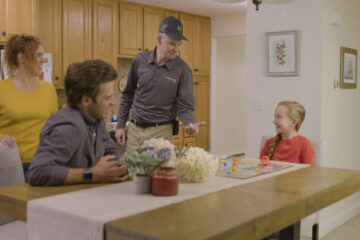“Johnny, get off the computer and finish your homework!”
“No, Mom, just one more minute!”
“No, Johnny—off right now!”
“But Mom, I’m almost at the next level!”
If you’re a parent or grandparent, chances are you’ve gone back and forth like this with your child at some point—it’s a familiar tug-of-war in many households. I know I did when I was raising my kids!
Most parents have experienced this exhausting cycle of setting boundaries that resulted in pushback from their children. What begins as a simple request to complete homework or limit screen time quickly escalates into a full-blown confrontation, leaving both parent and child feeling frustrated and angry. Resistance and conflict are persistent challenges parents face. Highlighting the importance of intentional, heart-focused training over mere behavioral control is crucial and can lead to lasting change.
Persistent arguing leaves us, and our children, exhausted and angry. Prolonged disputes may often occur due to your child’s desire to control their environment or may result from expressing frustration because of their limited autonomy. This is a significant factor with young children who cannot express their frustration. Often, this is because of their underdeveloped emotional regulation skills, difficulty accepting disappointment, or an immature understanding of who’s in charge. Just ask most two-year-olds, and they will tell you they are the boss! Rather than viewing these conflicts as willful defiance, parents can use them as opportunities to teach essential life skills.
A more effective approach focuses on developing the child’s heart to want to do what is right rather than simply managing their external behavior. This heart-centered method acknowledges that sustainable change originates from within and aims to equip children with the emotional and social tools they need to navigate challenges independently. Instead of asking, “How can I make my child comply?” this approach asks, “What skills does my child need to handle this situation more effectively?” This aligns with the wisdom of Proverbs 4:23: “Above all else, guard your heart, for everything you do flows from it.” When we focus on the heart, we address the source of behavior rather than merely its symptoms. It is a more loving way to guide and discipline.
Teaching children how to respond correctly they can learn to respond with acknowledgment and acceptance rather than immediate protest. Similarly, when asked to complete an undesirable task, children can learn to express compliance verbally before taking action. For young children, you can use the yes-no sandwich technique. “Mommy, can we go to the park?” Instead of saying no, your baby sister needs a nap, reply, “Yes, we can as soon as your sister wakes up from her nap, yes, we will go then.” If you say no, we can’t, because your sister is asleep, this will foster sibling rivalry. However, the yes-no sandwich works because they hear the word ‘yes’ instead of ‘no’. In addition, helping your child learn how to respond helps them develop self-regulation skills that will serve them throughout their lives.
The ultimate goal of this parenting philosophy extends far beyond reducing daily conflicts. By investing in character development during childhood, parents are preparing their children for future relationships, academic challenges, professional responsibilities, and personal struggles. The skills learned through heart-based training become the foundation for healthy marriages, successful careers, and meaningful friendships. This long-term perspective transforms everyday discipline moments into opportunities for life preparation rather than mere behavior modification. Most importantly, it strengthens the connection between parent and child, building a lasting bond of love and trust.
When parents respond to conflict with gentleness rather than harshness, they model the very behavior they hope to see in their children. Proverbs 15:1 illustrates this principle: “A gentle answer turns away wrath, but a harsh word stirs up anger.” By refusing to engage in unproductive arguments, parents demonstrate mature conflict resolution skills and create opportunities for effective teaching. Similarly, 2 Timothy 2:23-24 advises, “Don’t have anything to do with foolish and stupid arguments, because you know they produce quarrels. The Lord knows that I engaged in too many arguments when my children were growing up. I only wish I had known what I know now, because it would have made a significant difference, especially during the teenage years. The goal is to help your family grow together in an atmosphere of love, trust, and respect, not one built on fear or strict control. Most of all, we want to give kids the tools they need to thrive on their own while staying connected to their families through strong, trusting relationships. Obedient kids are often happy kids.
Lee Ann Mancini is the author of Raising Kids to Follow Christ, Instilling a Lifelong Trust in God, founder of Raising Christian Kids, adjunct professor at South Florida Bible College & Theological Seminary, and executive producer of the animated series Sea Kids on Right Now Media, Pure Flix, Answers.tv, Minno, and Yippee. Lee Ann is the mother of two adult children and lives with her husband in South Florida, where she passionately pursues her calling to help parents raise lifelong Christ-followers.














